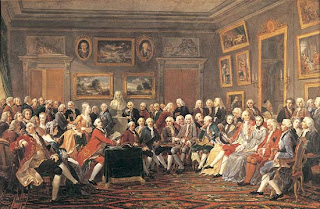
In the 1760's America was facing Civil challenges such as disagreements with the Paxton Boys and the revolt of North Carolina "Regulators." Controversies like these weakened and further disorganized the Colonies, making difficult for them to make coordinated attacks against British authority. In this era of American dispute, divided local governments had less power than they would united, and the British had much more control over a divided 'nation' than a united one. Instead of utilizing this key advantage, the unstable British government did one of the worst things they could possibly do: unite and empower the people of America. By putting in place legislation such as the Sugar and Stamp Acts, the British only further angered the American population. Colonists thought these acts were taxing not only their businesses and property, but their freedom and as a result, were able to put aside their differences and recognize the need to unite and stand up to the current injustice. This anger only led to further outcry against the British government. The strongly voiced disapproval of the Stamp Act forced parliament to repeal it in 1766, but this was only a small, first step in the direction of freedom. From then on, Americans began to challenge and reject the English laws, and eventually English government, which led to the ultimate rebellion: the Declaration of Independence (1776). The poor choices made by leaders such as King George III and George Grenville to unreasonably tax and anger Americans gave the colonists power and desire to rebel against British. It was these decisions that ultimately brought about American Revolution, and the eventual declaration of independence from England.
